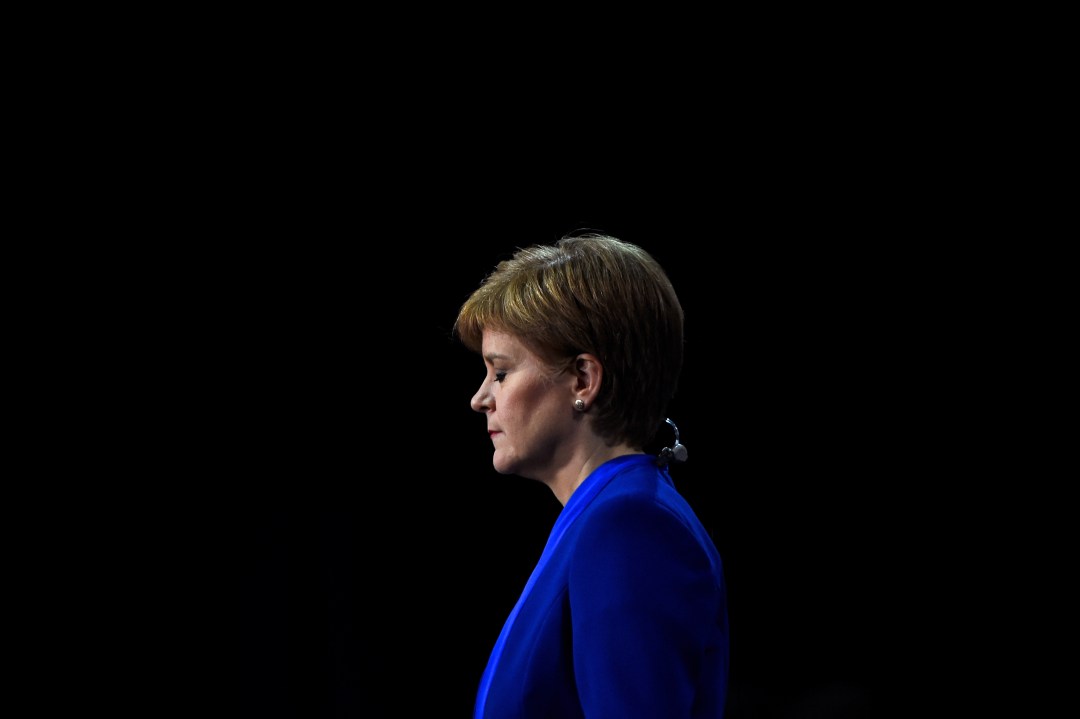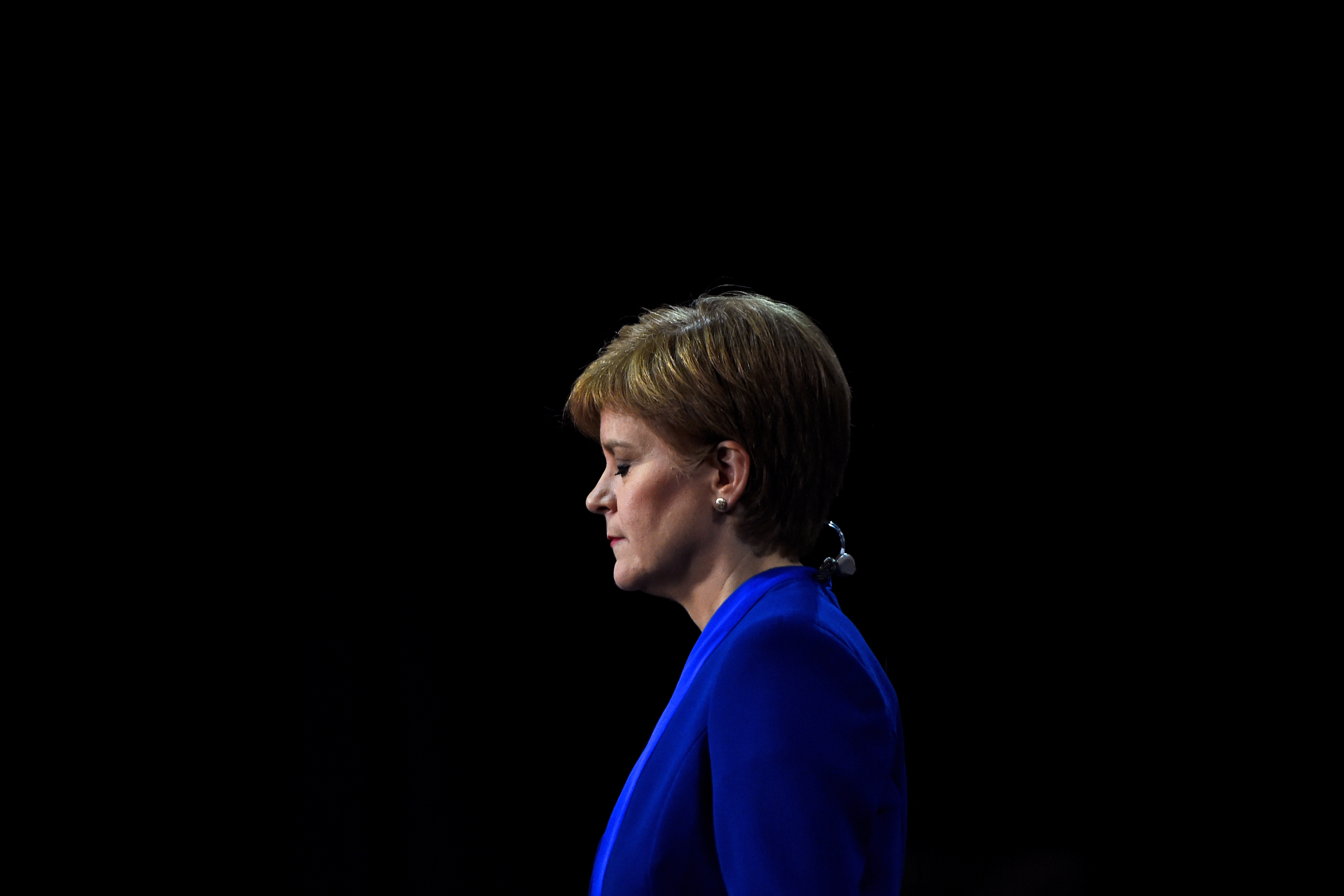Tiresome things, words. And it is even more tiresome when people insist they retain their traditional meanings. Thus I suppose one may sympathise with Peter Murrell, chief executive of the SNP and — for this is not irrelevant to the subject being discussed here — husband to Nicola Sturgeon.
In January 2019, Alex Salmond was arrested by Scottish police officers and charged with 14 offences, chiefly of a sexual nature. Salmond was later, as we all know by now, acquitted on all counts that eventually made it to court (though one of those, a charge of sexual assault with intent to rape, was found not proven). But on the day Salmond was arrested, Murrell sent a brace of text messages to — it is believed — another SNP official. The first of these reads:
Totally agree folk should be asking the police questions. Report now with the PF [Procurator Fiscal] on charges which leaves police twiddling their thumbs. So good time to be pressurising them. Would be good to know Met [the Metropolitan police] looking at events in London.
The poor layman, possessing only an ordinary man’s idea of what ‘pressurising’ might mean, could think this was a message designed to rally support for the idea that the police should be pressed to investigate Salmond further and more thoroughly than they had hitherto done.
But Mr Murrell, being a creature of superior subtlety, knows better. This message, like others, has ‘been presented in a way that suggests a meaning’ that ‘in reality’ it does not have. If by ‘reality’ you mean ‘in every world except this’ then Mr Murrell may have a point.
Today, Mr Murrell says in evidence submitted to a Holyrood committee that he did not express himself well but his ‘intention’ was to advise other individuals ‘that their questions’ about anything related to the case ‘should be addressed to the police and not the SNP’.
It seems curious that Murrell, the SNP’s chief executive, knew nothing of what was discussed
Well, if you believe that you will believe anything.
The second message sent by Mr Murrell that day — or rather, the second message of which we are aware — argued: ‘TBH [to be honest] the more fronts he [Salmond] is having to firefight on the better for all complainers. So CPS [Crown Prosecution Service] action would be a good thing’. Mr Murrell says his ‘intended meaning’ was that ‘any and all complaints should be appropriately investigated. The tone of it is a reflection of the shock, hurt, and upset that I, and so many other in the SNP, felt that day given the events that had unfolded in court the previous day’.
Well, if you believe that you’re a cheaper date than those who believe Mr Murrell’s explanation of the first of these messages.
We might also note that for all the ‘shock’ Mr Murrell professes now, neither of these texts are overly laden with surprise. On the contrary, they give the impression to have been written from a position of some knowledge.
Which would be a surprise if other things Mr Murrell has said are to be believed. Strictly speaking, this Holyrood inquiry is only charged with investigating the Scottish government’s procedures for allegations of sexual harassment which, having been updated in the light of #MeToo, retrospectively allowed them to investigate complaints against former ministers. Nevertheless, the interface between the government and the SNP is also an unavoidable element of this entire squalid saga and one made all the more unavoidable by the fact that the SNP’s leader happens to be married to its chief executive.
For her part, Nicola Sturgeon insists she has done nothing wrong. Indeed, she complains that she has been accused of conspiring against Alex Salmond — purportedly in an attempt to quash any hopes he might have of a political comeback — as well as of colluding with him to get him off a hook of her own creation. As she reasonably points out, it would be difficult for both of these things to be true.
Noting that, however, scarcely means neither is true, even if the most probable reality remains that — this being the Scottish government — the botched investigation into Salmond was a serious of cock-ups rather than a coherent conspiracy.
And yet for people with nothing to hide, Sturgeon and Murrell are behaving in a manner which tests a reasonable person’s willingness to suspend their disbelief. The first minister has previously insisted she first heard about the complaints made against Salmond from Salmond himself, during a meeting at her house on 2 April 2018. This, she told parliament, was a party meeting and one she attended sporting her SNP bonnet, not her Scottish government hat.
She claims she met Salmond — at his request — because she thought he was in a spot of bother and might be about to resign from the party. But if this was a party matter, it seems curious that Murrell, the SNP’s chief executive, knew nothing of what was discussed at this meeting and certainly never talked about it with the party leader. The party leader with whom he lives. But this is what Murrell has told the committee. Sturgeon was attending to a party matter but the party chief executive appears to have behaved as though it was a government one.
Awkwardly, Geoff Aberdein, formerly Salmond’s chief of staff, testified in court that he had informed the first minister of the complaints made against Salmond at a meeting he had with her on 29 March 2018. In written evidence to the committee, published today, Sturgeon says she had ‘forgotten’ about this encounter. It was a busy day, after all, and she could not reasonably be expected to recall that ‘the discussion covered the fact that Alex Salmond wanted to see me urgently about a serious matter’ that ‘might relate to allegations of a sexual nature’.
I put it to you, dear reader, that this is the sort of conversation one might expect any politician to recall, let alone one as notoriously detail-oriented as Ms Sturgeon. Or to put it another way, if David Cameron’s chief-of-staff were to have told Theresa May that Cameron was being investigated over allegations of a sexual nature, I would expect Mrs May to be able to recall that conversation. Wouldn’t you?
At best Sturgeon’s defence is highly Jesuitical: she had a rough idea of what was happening but, as she told parliament, she only learned the specific details from Alex Salmond. This would seem to be the basis for her defence against suggestions she has, at best, misled the Holyrood parliament.
There are, in any case, other reasons to disbelieve aspects of the Sturgeon-Murrell arguments that no-one knew anything and even if they had that would have been fine. For we also know that one of the complainants in the Salmond trial had told SNP HQ in late 2017 about her concerns about Salmond. This woman had given the party a broad picture of events that led to an extremely serious charge being made against the former first minister. In response to this, the SNP did precisely nothing. Indeed, a senior party official told the woman that the party would ‘sit on’ this information, trusting that it might never need to be deployed.
And yet, once again, we are asked to entertain the proposition that a senior SNP official was made aware of a serious complaint about the party’s former leader and yet this information never made it to the party’s chief executive or the party’s leader? Like all things, I suppose we must concede this is feasible but it does not seem remotely plausible or, for that matter, at all appropriate.
That is not a matter for the Holyrood committee but it seems equally as important as the questions the committee has been asked to explore. Indeed, a poor layman might think it more important.
Nevertheless, today’s release of written evidence does little to diminish the gathering suspicion that not everyone in this process is being quite as candid as perhaps they could be. No wonder, then, the committee chair, Linda Fabiani, an SNP MSP, has complained her panel’s work is being obstructed by the SNP and the Scottish government. Because on the basis of today’s evidence, each of these institutions has every reason to wish to obstruct any attempt to establish what really happened in the course of a scandal that is also a fiasco and a deeply sordid one at that.








Comments